“Just like the official exam, my GRE Mock Tests at Galvanize had 6 sections starting with the AWA. All the sections were timed and comprised of realistic GRE questions. In fact, my actual GRE felt just like another Galvanize GRE Mock Test!”
[Galvanize Exclusive]
Free Full-Length GRE Mock Test
Supercharge Your Preparation, Test Your Readiness & Get Your Score Along With Detailed Analytics.
Why should you take this full-length GRE Mock Test?
Familiarity with Test Format
The GRE mock test provides a simulated experience of the actual exam, allowing test-takers to become familiar with the format, structure, and timing of the test. This familiarity helps reduce anxiety and will boost your confidence on the actual test day.
Identifying Strengths and Weaknesses
Taking a GRE mock test helps identify areas of strength and weakness in your knowledge and test-taking skills. By reviewing your performance on the mock test, you can pinpoint specific topics or question types that require further study and practice.
Practice Under Realistic Conditions
This GRE mock test offers an opportunity to practice under realistic testing conditions. By replicating the test environment, you can assess your ability to perform under pressure and develop strategies to manage your time effectively during the exam.
Here's what you'll get from this Free GRE Mock Test!
Section-wise in-depth analytics
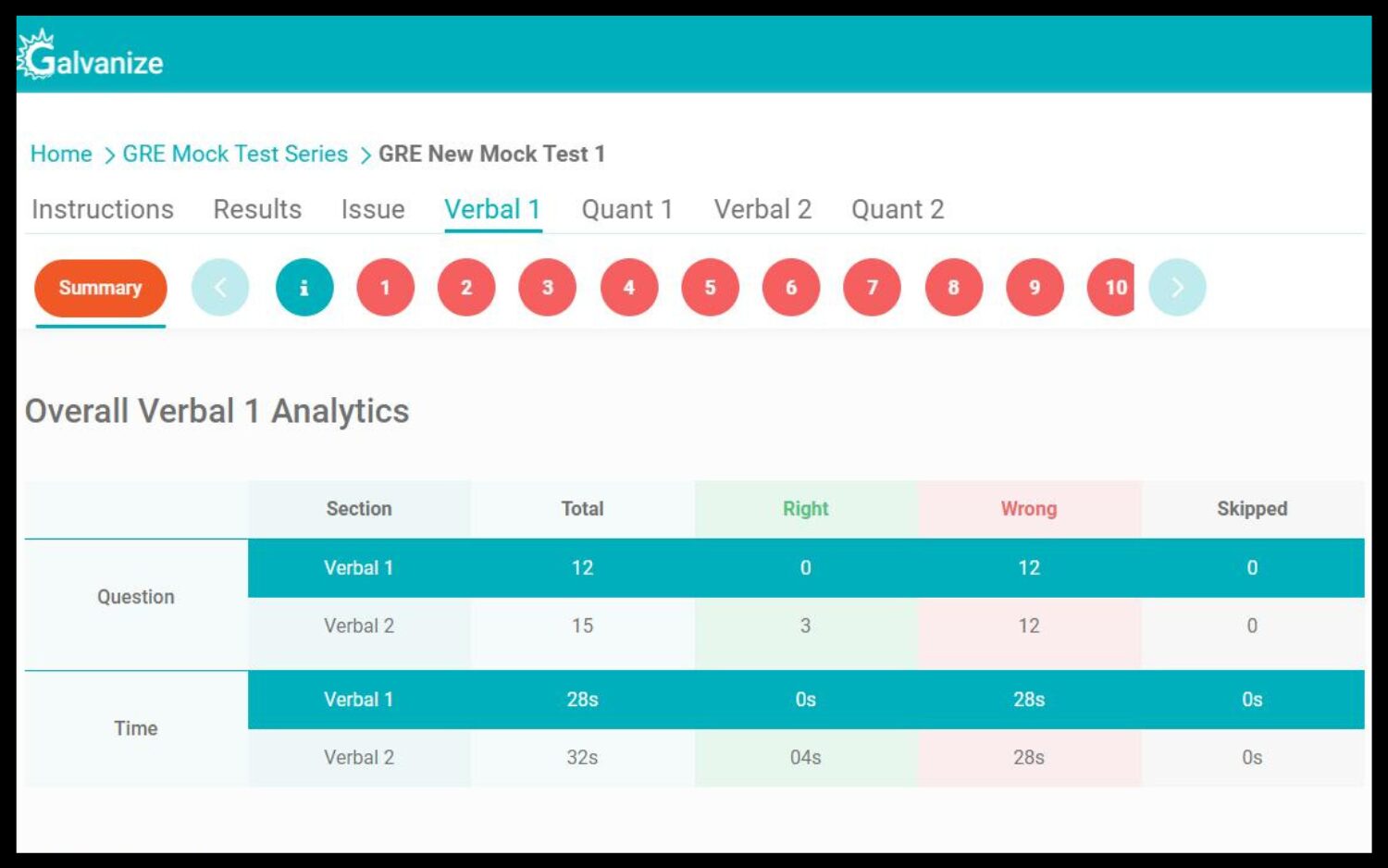
Time taken by YOU vs Others
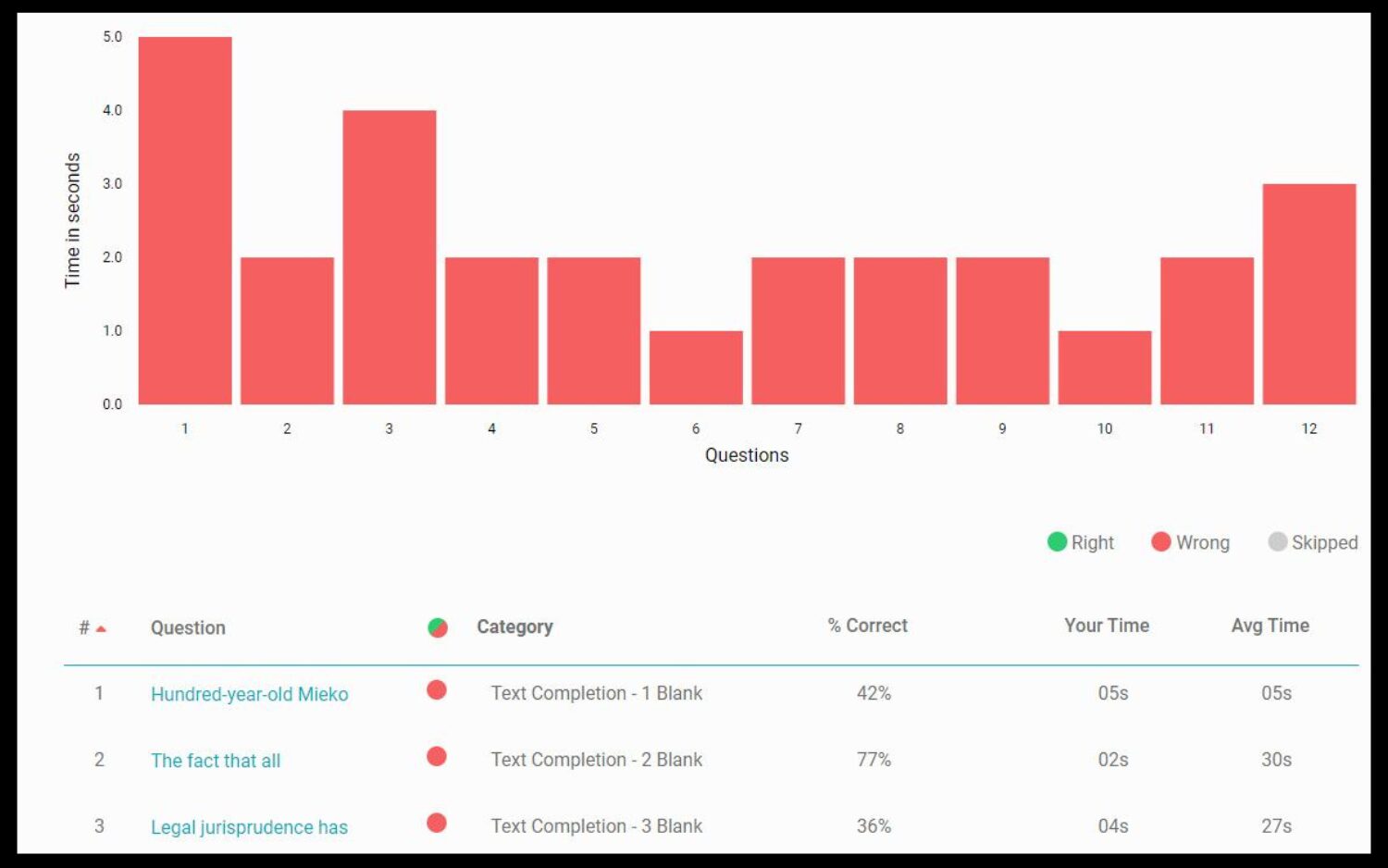
Explaination of all answers
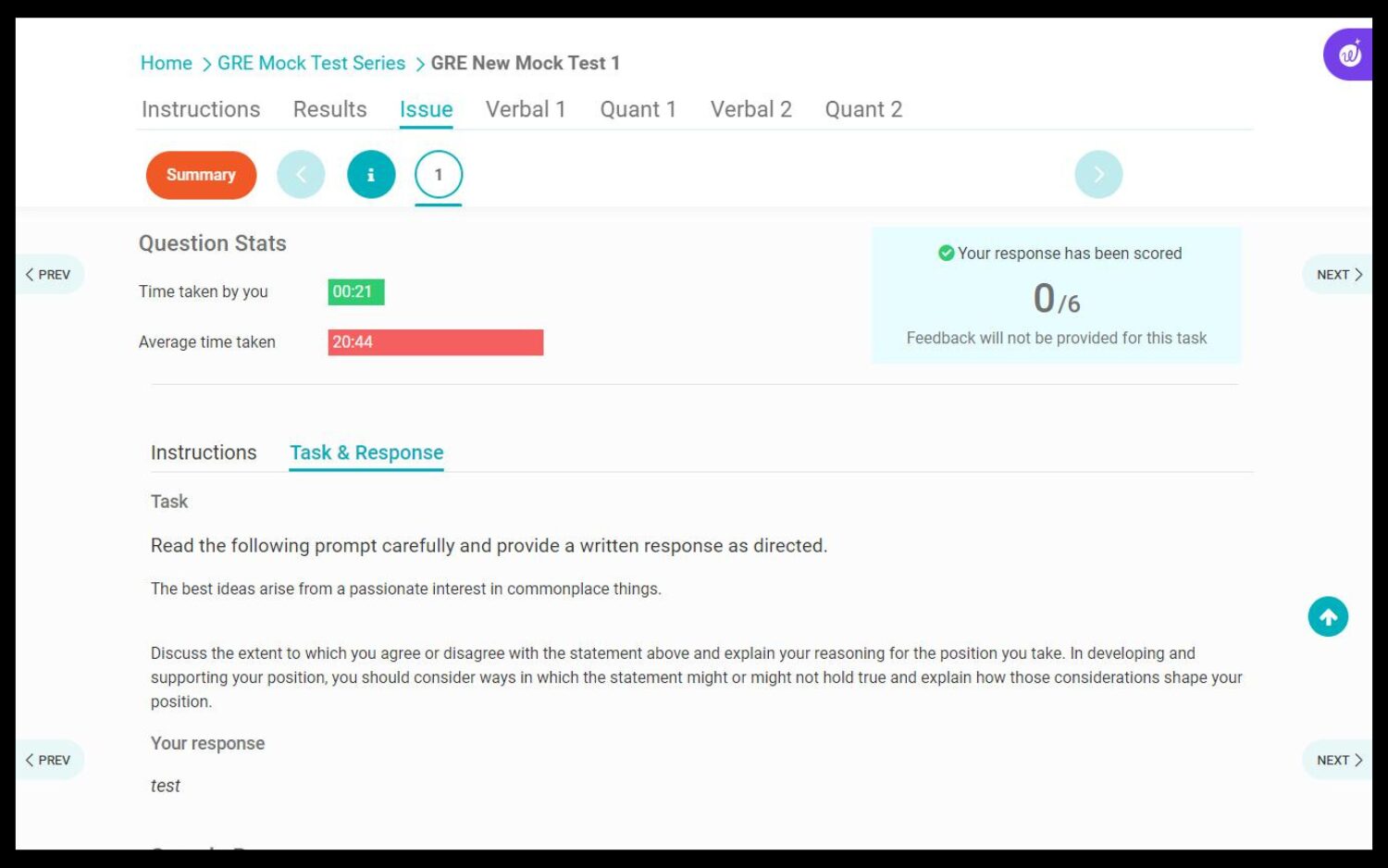
Your FINAL Results
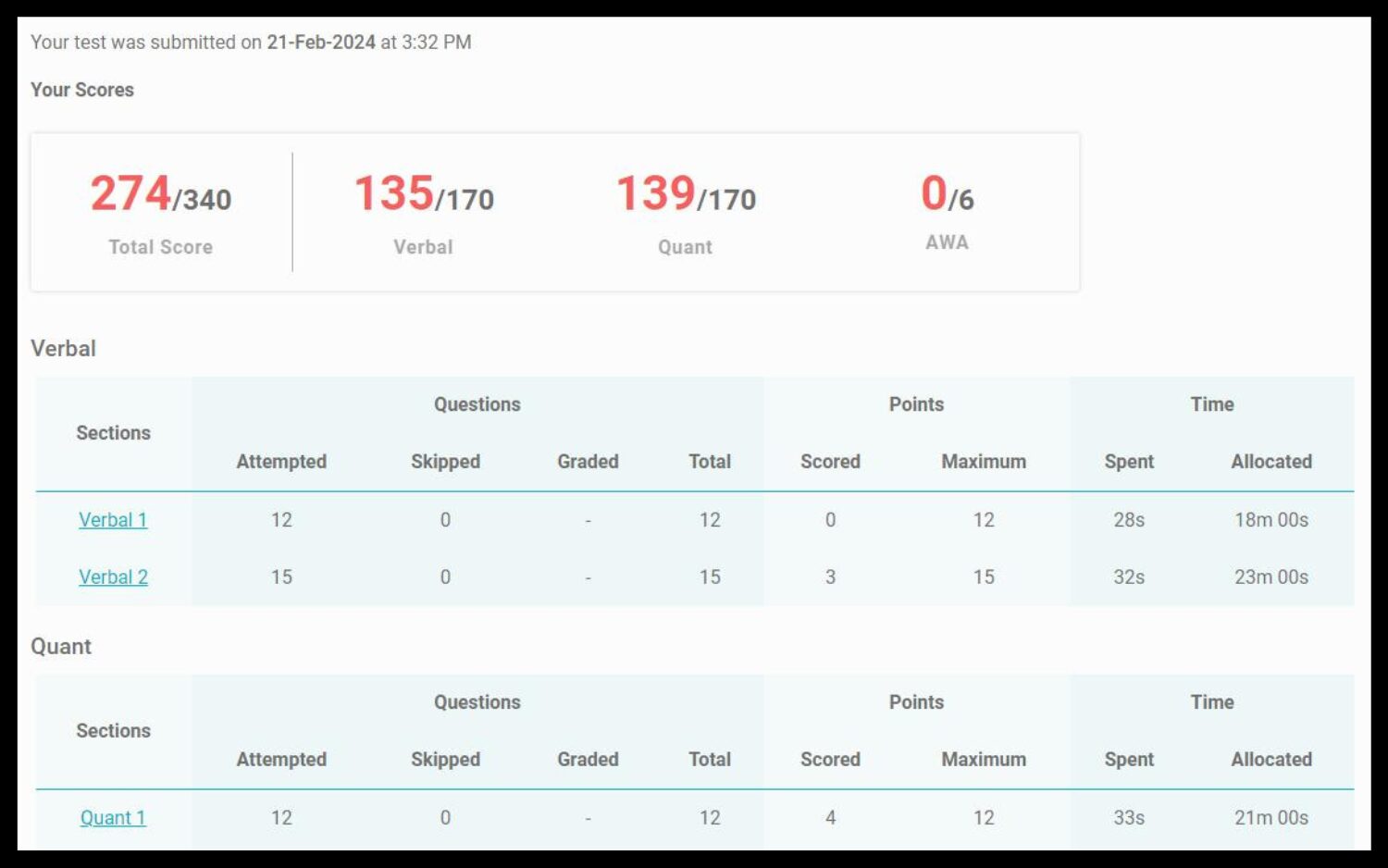
What students have to say about the Galvanize GRE Mock Test!

John Trujillo, Ecuador

Suyog Ghungrad, India
“While preparing with Galvanize I came across a lot of practice questions topic-wise and tests with various levels of difficulty. Moreover, when I started giving the full-length mock tests I felt that these tests were exactly like the real-time GRE.”
If you were to take the GRE today, do you know what your score would be? Let's face it.
Take The GRE Mock TestAn overview of the GRE Test.
About the GRE Test
The GRE General Test mirrors the cognitive processes required in contemporary and rigorous graduate school programs, encompassing fields such as business and law. It assesses your abilities in verbal reasoning, quantitative reasoning, critical thinking, and analytical writing. These skills, cultivated over an extended period, are not tied to any particular academic discipline but hold universal significance.
You can utilize GRE scores to seek admission to various graduate, business, and law programs, including those offered at prestigious institutions.

The GRE Test Pattern.
The Verbal Reasoning section now prioritizes skills in reading comprehension, sentence equivalence, and text completion. There are two sections, each containing 27 questions and allowing 41 minutes for completion.
The Quantitative Reasoning section evaluates quantitative reasoning, data interpretation, and mathematical skills. Two sections (27 questions/section, 47 minutes/section)
The Analytical Writing section now includes only one essay: the Issue Task. You have 30 minutes to complete this essay.
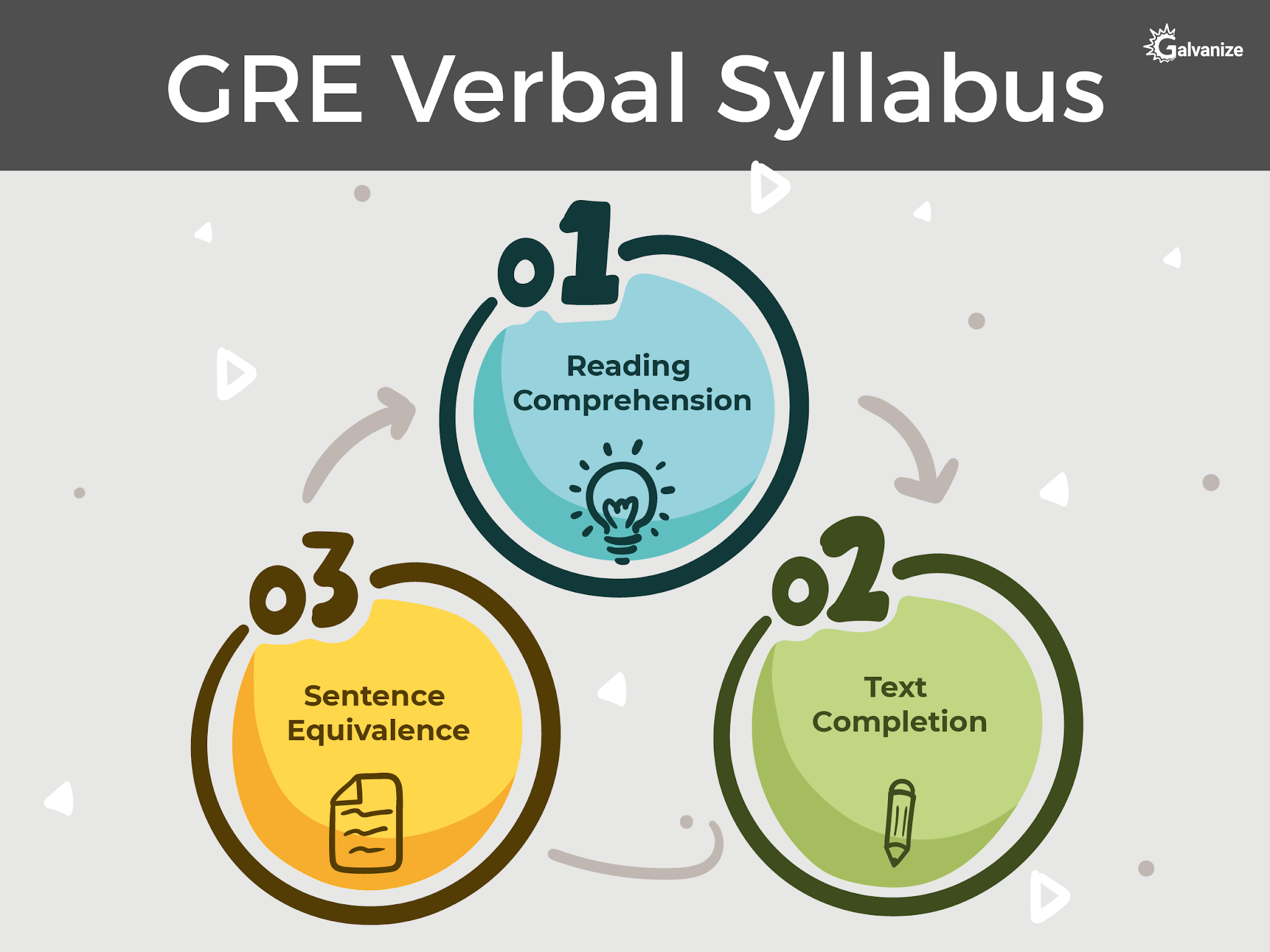
GRE Verbal Reasoning
The GRE Verbal Reasoning section evaluates your ability to understand and analyze written material, as well as to evaluate arguments and synthesize information. It includes reading comprehension questions, sentence equivalence questions, and text completion questions. This section assesses your proficiency in comprehending and interpreting complex written passages, your vocabulary skills, and your ability to draw conclusions and make inferences. The Verbal Reasoning section is a critical component of the GRE exam, testing your verbal abilities essential for success in graduate-level studies.
GRE Quantitative Reasoning
The GRE Quantitative Reasoning section measures your ability to interpret and analyze quantitative information, solve problems using mathematical concepts, and apply mathematical reasoning to real-life scenarios. It includes questions covering arithmetic, algebra, geometry, and data analysis. This section assesses your proficiency in understanding and manipulating numerical data, your problem-solving skills, and your ability to apply mathematical concepts to solve problems. The Quantitative Reasoning section is an important component of the GRE exam, evaluating your quantitative abilities essential for graduate-level studies, particularly in fields such as mathematics, science, engineering, and economics.
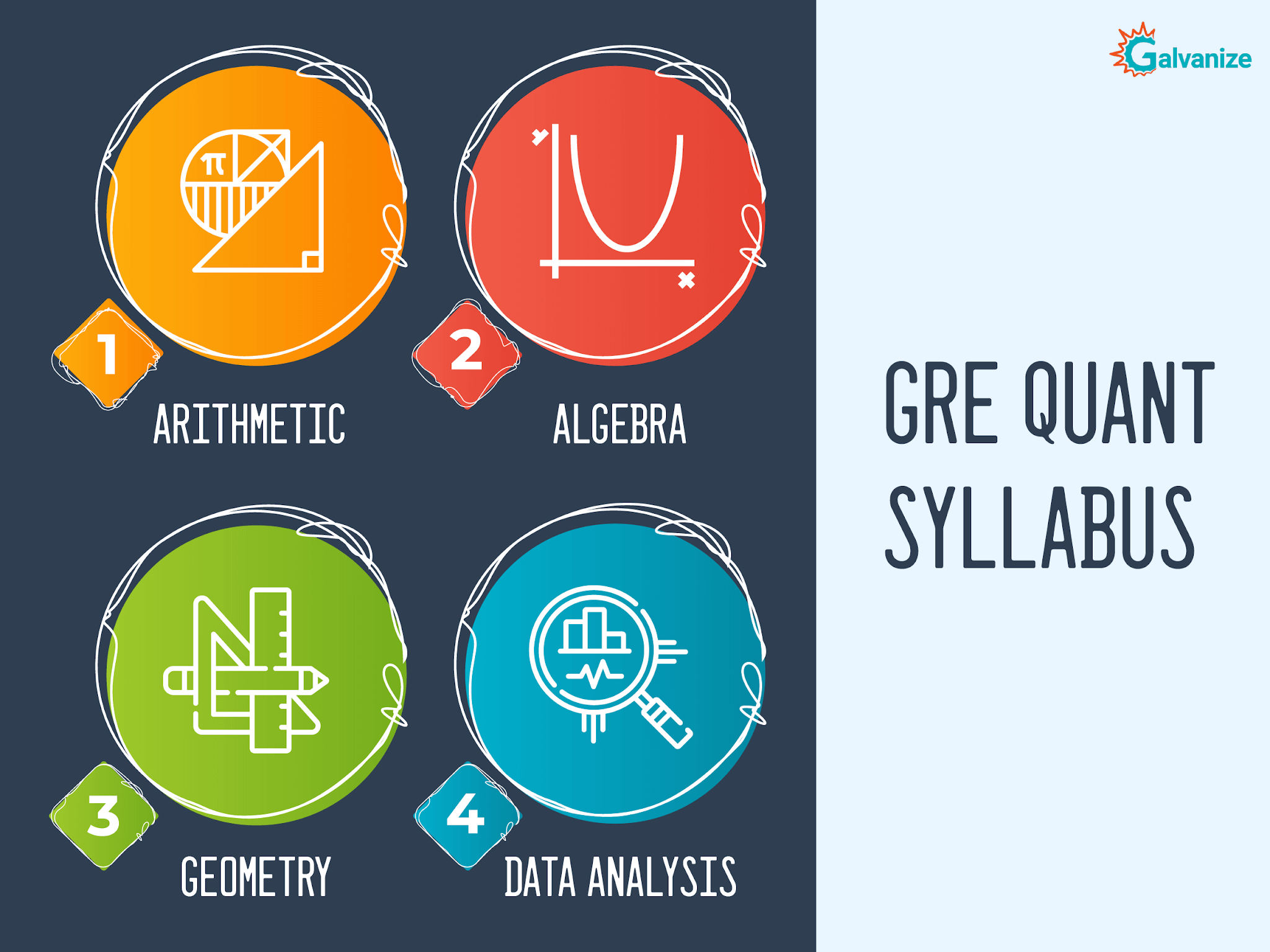

GRE Analytical Reasoning
The GRE Analytical Writing section assesses your ability to articulate complex ideas clearly and effectively, analyze arguments, and provide thoughtful and coherent responses. It consists of two tasks: Analyze an Issue and Analyze an Argument. In the Analyze an Issue task, you are presented with a statement and asked to present your perspective on the issue. In the Analyze an Argument task, you evaluate an argument and provide a critique, identifying its strengths and weaknesses. This section evaluates your skills in critical thinking, logical reasoning, and written communication. It also assesses your ability to develop and support ideas with relevant examples and evidence.
Get familiar with the GRE Test Format & identify your strengths and weaknesses today!
Take The GRE Mock TestTop universities accepting GRE Scores!
















Note: These are just the Top Universities. GRE scores are accepted by over 1500 universities worldwide.
Our Top GRE Scorers
Sushmita V
IIT-Madras
GRE Score: 338
Siddarth K
IIT-ISM, Dhanbad
GRE Score: 336
Zihad
BUET, Bangladesh
GRE Score: 336
Rani Shrern
IIT-Bombay
GRE Score: 335
Lakshmi G
IIIT-Hyderabad
GRE Score: 335
Devesh S
NIT-Delhi
GRE Score: 335
Anirudh
SSN, Chennai
GRE Score: 335
Antareep G
IISER, Kolkata
GRE Score: 333
Abhishek Pandit
SVNIT, Surat
GRE Score: 332
Indranil C
DTU, Delhi
GRE Score: 332
What is the GRE Exam Fee?
ETS has introduced revised GRE fees starting from July 1, 2023. In India, the GRE fee for 2024 amounts to ₹22,550, while it stands at $220 globally, except in China, where it is $231.30. Besides the GRE application fee, it’s crucial to consider additional expenses such as rescheduling, late registration, and cancellation. This blog delves into the GRE fee structure, payment methods, and other essential aspects of applying for the 2024 GRE test.
Challenges encountered by students during the GRE Exam
Achieving a GRE score exceeding 330 relies more on maintaining composure throughout the test rather than mastering every subject perfectly. It’s a measure of mental resilience as much as academic proficiency. Let’s examine some of the challenges candidates encounter here:
Sitting through computer-based tests: Navigating a computer-based exam like the GRE demands not just subject mastery but also the ability to sustain focus and problem-solve over extended periods at the computer. Candidates must prioritize honing their efficiency in computer-based testing alongside subject preparation. The mental and physical strain involved can significantly influence one’s final score.


Sustaining a consistent approach to test preparation: Initially, many candidates excel in their preparation efforts. However, after about a month, the trajectory of preparation often begins to decline. It’s crucial for students to begin gradually and steadily increase their pace, ensuring they maintain motivation as the test day approaches.
Managing time: Many candidates prioritize obtaining correct answers during practice sessions but overlook the importance of optimizing their time while tackling questions. Time management poses a significant challenge in the GRE. Often, candidates find themselves unable to answer the last few questions in a section due to time constraints, resulting in substantial setbacks. Avoid leaving questions unanswered. Practice effective time management, ensuring you allocate no more than the allotted time for each question.


Too much focus on one section: Many candidates exhibit confidence in either the verbal or quantitative sections, often dedicating extensive preparation to their weaker area. However, maintaining a balanced approach is crucial since both sections require adequate practice. While it’s essential to focus on strengthening weaker sections, ensure not to overlook topics you perceive as strengths.
Tricky quant problems: Many GRE math problems integrate multiple concepts within a single question. Take your time to carefully read the questions, avoiding the urge to rush through to the end. Instead, focus on identifying the primary concepts involved. If a question remains challenging even after reading it multiple times, consider making a logical guess and proceeding to the next question.


Vocabulary is important: Mastering the GRE word list can prove challenging. It’s essential to plan ahead and consistently review the meanings and usage of numerous new words. Incorporating these words into your essay writing can help reinforce your understanding and usage of them.
Losing the plot in Analytical Writing: Skipping the AWA section during mock tests is a common error that can lead to significant challenges during the actual exam. Candidates must develop a clear strategy for constructing their essay cohesively within the allotted time. This necessitates ample practice and exposure to various essay structures through extensive reading.

Get Accurate Scores with Our Free GRE Online Mock Test!
Take The GRE Mock TestFill in your basic details to access the Free GRE Mock Test!
Meet the team

Pavithra Srinivasan
Co-founder & Head of Customer Experience
M.S., Stanford University

Sriram Venkatraman
Co-founder & Chief Product
Architect
B.Tech., IIT Madras

Sowmya
Subramaniam
Head of Academics
M.Sc, Maths, IIT Madras

Jayanthy
Ramakrishnan
Head of Admissions

